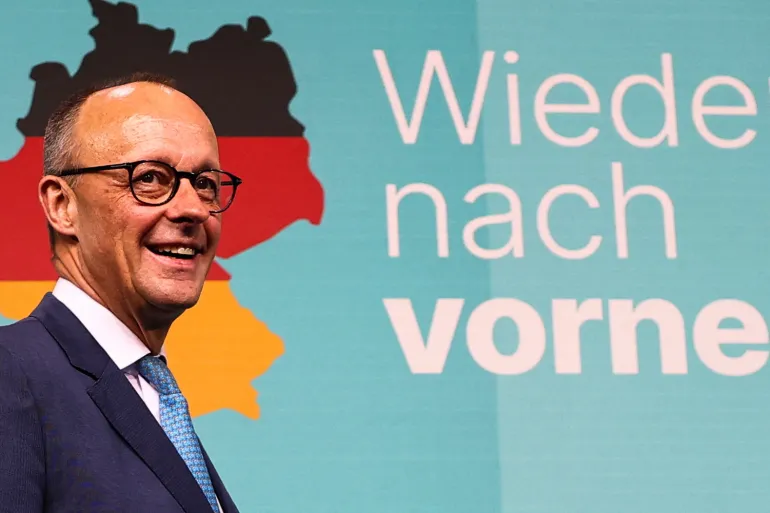Friedrich Merz is set to be sworn in as Germany’s next chancellor on Tuesday, heading a cabinet faced with challenges from an ailing economy to fraying US ties and a resurgent far right.
Here are his key picks to help govern Europe’s top economy in the coalition between his conservative CDU/CSU alliance and the centre-left SPD:
– Finance: Lars Klingbeil –

Lars Klingbeil, 47, has long worked behind the scenes in the Social Democratic Party (SPD) of outgoing Chancellor Olaf Scholz and is partly responsible for the campaign that saw it sink to its lowest result for 80 years.
Described as “impassive, unassuming, inoffensive, almost boring” by Der Spiegel magazine, Klingbeil is nevertheless the new leader of Germany’s oldest party now that Scholz has stepped back.
Klingbeil will take over the finance ministry of Europe’s largest economy and also serve as vice chancellor.
He will have significant fiscal firepower after parliament approved Merz’s proposals in March to spend hundreds of billions of euros on defence and infrastructure in a “bazooka” spending package.
– Foreign: Johann Wadephul –
Former soldier Johann Wadephul, 62, was a low-profile politician but became known as a strong supporter of sending military aid to Ukraine and as a stern critic of Russian President Vladimir Putin.
In April, Wadephul told a Berlin conference that Russia was the most “acute threat” to Europeans, after some politicians from the SPD and CDU floated the idea of resuming energy and trade ties with Moscow.
A member of the Bundestag since 2009, Wadephul wants Berlin to give Kyiv longer-range Taurus missiles that would allow it to hit targets deeper inside Russia.
Like Merz, he wants to reboot the Franco-German relationship at the heart of the EU.
A key challenge for Merz and his top diplomat will be forging a response after US President Donald Trump has urged European allies to step up defence spending while also threatening transatlantic trade.
– Defence: Boris Pistorius –
Boris Pistorius, 65, of the SPD will stay on as defence minister under Merz, having become popular in the role under Scholz — no mean feat in a country whose dark Nazi past has fostered a strongly pacifist tradition.
Seen as dynamic and straight-talking, Pistorius has a hard road ahead of him.
Germany’s armed forces are undermanned and undersupplied, with much of a 100 billion euro ($113 billion) special fund established in 2022 spent on sending help to Ukraine.
Pistorius will have more money at his disposal after the Bundestag voted to exempt much defence spending from Germany’s strict borrowing limits.
Pistorus shocked many in his own party when he told the Bundestag last year that Germany’s military had to be “war-ready” by 2029 to scare off potential adversaries.
“We must establish deterrence to make sure that it does not come to the worst-case scenario,” he said.
– Economy: Katherina Reiche –
Katherina Reiche, 51, of the CDU is returning to politics after a stint as an energy executive at Westenergie, a subsidiary of utility E.ON.
She grew up in East Germany and studied chemistry, inviting comparisons to her party’s ex-chancellor Angela Merkel, under whom Reiche held roles in the environment and transport ministries before quitting politics in 2015.
In 2012, Reiche sparked controversy after linking gay marriage to declining birth rates, removing her Facebook page after it was inundated with abuse.
“Our future lies in the hands of families, not in same-sex partnerships,” she told the Bild newspaper. “Next to the euro crisis, demographic development is the greatest threat to our prosperity.”
– Interior: Alexander Dobrindt –
Alexander Dobrindt, 54, of the Bavarian CSU, has called for a harder line on asylum seekers and irregular migration and will now be under pressure to deliver results as the hard-right AfD strengthens in the polls.
Dobrindt has advocated traditional family values and been critical of same-sex marriage, voting against its legalisation in Germany in 2017.
As transport minister under Merkel, the trained sociologist drew controversy for trying to introduce road tolls for foreign drivers, which was ruled contrary to EU law.
– Other Ministers –
Patrick Schnieder, CDU: Transport
Nina Warken, CDU: Health
Karsten Wildberger, CDU: Digital and State Modernisation
Wolfram Weimer, CDU: Culture and Media
Karin Prien, CDU: Education
Stay ahead with the latest updates!
Join The Podium Media on WhatsApp for real-time news alerts, breaking stories, and exclusive content delivered straight to your phone. Don’t miss a headline — subscribe now!
Chat with Us on WhatsApp








